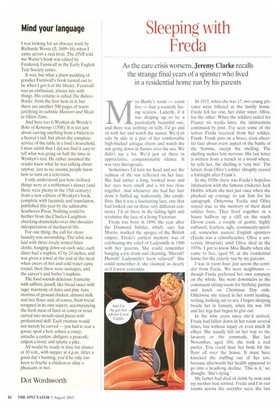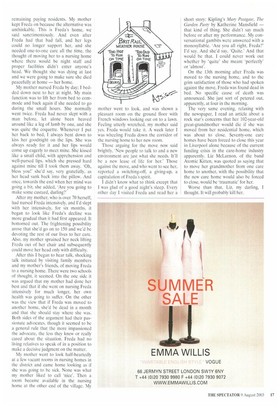Sleeping with Freda
As the care crisis worsens, Jeremy Clarke recalls the strange final years of a spinster who lived in a residential home run by his parents Miss Busby's room — room five — had a westerly facing seaview. Latterly, if it was shaping up to be a particularly beautiful one, and there was nothing on telly, I'd go and sit with her and watch the sunset. We'd sit side by side in a pair of her comfortable high-backed antique chairs and watch the sun going down in flames over the sea. We didn't say a lot. We'd just sit there in appreciative, companionable silence. It was very therapeutic.
Sometimes I'd turn my head and see the redness of the sun reflected on her face. She had rather a long, hooked nose and her eyes were small and a bit too close together. And whenever she had her hair done it fluffed up, ludicrously, like candyfloss. But it was a fascinating face, one that had looked out on three very different centuries. I'd sit there in the failing light and scrutinise the face of a living Victorian.
Freda was born in 1898, the year after the Diamond Jubilee, which, says Jan Morris, marked the apogee of the British empire. Freda's earliest memory was of celebrating the relief of Ladysmith in 1900 with her parents. She could remember banging a toy drum and chanting, 'Hurrah! Hurrah! Ladysmith's been relieved!' She could remember it, she claimed, as clearly as if it were yesterday. In 1915, when she was 17, two young privates were billeted at the family home. Freda fell for one, her elder sister, Olive, for the other. When the soldiers sailed for France six weeks later, the infatuations continued by post. I've seen some of the letters Freda received from her soldier, Frank. Frank puts on a brave, even cheerful face about every aspect of the battle of the Somme, except the shelling. The shelling makes him nervous. His last letter is written from a trench in a wood where, he tells her, the shelling is 'very hot'. The letters from Olive's soldier abruptly ceased a fortnight after Frank's.
In the 1930s there was Freda's hopeless infatuation with the famous cricketer Jack Hobbs, whom she met just once when she plucked up courage to ask him for his autograph. Otherwise Freda and Olive stayed true to the memory of their dead soldier boys. They lived together in a house halfway up a cliff on the south Devon coast, a couple of gentle, highly cultured, fearless, ugly, community-spirited, somewhat austere English spinsters (Freda was a schoolteacher, Olive a university librarian) until Olive died in the 1970s. I got to know Miss Busby when she came to live, aged 95, at the residential home for the elderly run by my parents.
I was in room four, just across the corridor from Freda. We were neighbours — though Freda preferred her own company on the whole. She went downstairs to the communal sitting-room for birthday parties and lunch on Christmas Day only. Otherwise she stayed in her room reading, writing, looking out to sea. I began sleeping beside her in January, when she was 104 and her legs had begun to give out.
In the nine years since she'd arrived, Freda had fallen down in her room several times, but without injury or even much ill effect. She usually fell on her way to the lavatory or the commode. But last November, aged 104, she took a real purler. You could hear her body hit the floor all over the house. It must have knocked the stuffing out of her too, because afterwards her health appeared to go into a headlong decline. 'This is it.' we thought. 'She's dying.'
My father had died of drink by now and my mother had retired. Freda and I in our rooms across the corridor were the last remaining paying residents. My mother kept Freda on because the alternative was unthinkable. This is Freda's home, we said sanctimoniously. And even after Freda had that bad fall, and her legs could no longer support her, and she needed one-to-one care all the time, the thought of moving her to a nursing home where there would be night staff and proper facilities didn't enter anyone's head. We thought she was dying at last and we were going to make sure she died peacefully at home — her home.
My mother nursed Freda by day; I bedded down next to her at night. My main function was to lift her from bed to commode and back again if she needed to go during the small hours. She normally went twice. Freda had never slept with a man before, let alone been heaved around like a leg of lamb by one, and she was quite the coquette. Whenever I put her back to bed, I always bent down to kiss her goodnight on the lips. She was always ready for it and her lips would come up eagerly to meet mine, She kissed like a small child, with apprehension and well-pursed lips, which she pressed hard against mine till I took them away. Oh, bless you! she'd say, very gratefully, as her head sank back into the pillow. And once, towards the end when her mind was going a bit, she added, `Are you going to make some custard, darling?'
After my mother, who is over 70 herself, had nursed Freda intensively, and I'd slept with her intensively, for six months, it began to look like Freda's decline was more gradual than it had first appeared. It bottomed out. The frightening possibility arose that she'd go on to 150 and we'd be devoting the rest of our lives to her care. Also, my mother sprained her neck lifting Freda out of her chair and subsequently could move her head only with difficulty.
After this I began to hear talk, shocking talk initiated by visiting family members and my mother's friends, of moving Freda to a nursing home. There were two schools of thought, it seemed. On the one side it was argued that my mother had done her best and that if she went on nursing Freda intensively for much longer, her own health was going to suffer. On the other was the view that if Freda was moved to another home, she'd be dead in a month and that she should stay where she was. Both sides of the argument had their passionate advocates, though it seemed to he a general rule that the more impassioned the advocate, the less they knew or really cared about the situation. Freda had no living relatives to speak of in a position to make a decisive judgment on the matter.
My mother went to look half-heartedly at a few vacant rooms in nursing homes in the district and came home looking as if she was going to be sick. None was what my mother liked to call 'nice'. Then a room became available in the nursing home at the other end of the village. My mother went to look, and was shown a pleasant room on the ground floor with French windows looking out on to a lawn. Feeling utterly wretched, my mother said yes. Freda would take it. A week later I was wheeling Freda down the corridor of the nursing home to her new room.
Those arguing for the move now said brightly, `New people to talk to and a new environment are just what she needs. It'll be a new lease of life for her.' Those against the move, and who went to see her, reported a switching-off, a giving-up, a capitulation of Freda's spirit.
I didn't know what to think except that I was glad of a good night's sleep. Every other day I visited Freda and read her a
short story: Kipling's Mary Postgate, The Garden Party by Katherine Mansfield — that kind of thing. She didn't say much before or after my performance. My conversational gambits were answered with a monosyllable. `Are you all right, Freda?' I'd say. And she'd say. 'Quite.' And that would be that. I could never work out whether by 'quite' she meant `perfectly' or 'almost'.
On the 13th morning after Freda was moved to the nursing home, and to the grim satisfaction of those who had spoken against the move, Freda was found dead in bed. No specific cause of death was announced. She just sort of petered out, apparently, at four in the morning.
The very same evening, relaxing with the newspaper, I read an article about a rock star's concerns that her 102-year-old great-grandmother would die if she was moved from her residential home, which was about to close. Seventy-one care homes have been forced to close this year in Liverpool alone because of the current funding crisis in the care-home industry apparently. Liz McLarnon, of the band Atomic Kitten, was quoted as saying that to move her grandmother from one care home to another, with the possibility that the new care home would also be forced to close, would be 'traumatic' for her.
Worse than that, Liz, my darling, I thought. It will probably kill her.



































































 Previous page
Previous page